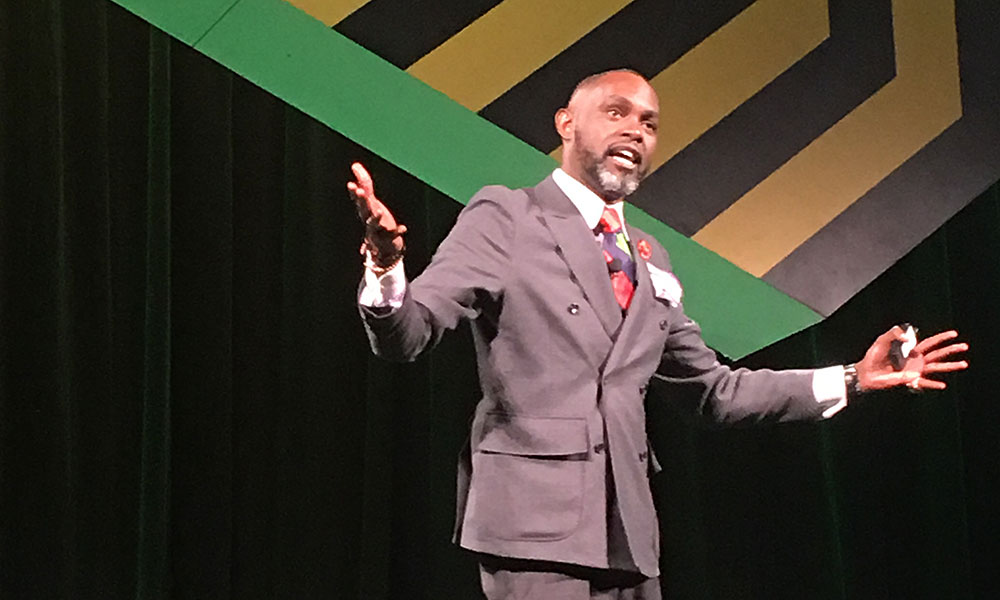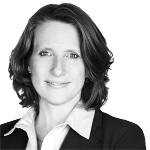
A Global Story of Soap and Hope from #ASAE16 Closing Keynoter
As #ASAE16 came to a close Tuesday, Derreck Kayongo, founder of the Global Soap Project, urged attendees to strengthen their powers of observation, commit to solving problems, and recognize their unique place in the world as U.S. citizens.
If attendees at the 2016 ASAE Annual Meeting & Exposition needed one last booster shot of inspiration before departing from Salt Lake City Tuesday, they got it from Derreck Kayongo.
Kayongo, founder of the nonprofit Global Soap Project and the conference’s closing keynoter, delivered a personal story of survival, discovery, and global service that had his audience alternately laughing, falling completely silent, and finally rising to their feet at the end of his 37-minute remarks.
Understand who you are. You are not here to be just here. You have power every day.
Kayongo credited simple observation as the catalyst for the Global Soap Project, which recycles partially used and discarded bars of soap from hotels and redistributes new bars to 90-plus countries where lack of proper hygiene claims more than 1.8 million lives every year, according to the organization.
After escaping the Ugandan civil war as a boy in 1979 and living among other refugees for more than a decade, Kayongo arrived as a young man in Philadelphia, where he saw to his surprise that the soap at the hotel where he was staying was replaced every day, after only one use. When a hotel concierge explained that the soap was thrown away, he said, “I went back to the room, and I lost it.”
“I’m the child of a man that made soap. I saw him make a lot of money doing that. And then we lost everything, and I became the child of a man that became a refugee and saw the power of soap as kids died of diarrhea and diseases and as mothers died of childbirth fever. And then I became the son of a man who came to the U.S. to go to school and saw hotels throw away 800 million bars of soap annually, which is 2.6 million bars of soap every single day. In juxtaposition: There are 2 million kids dying. I lost it.”
That revelation led to the idea for a soap-recycling program and eventually to the organization Kayongo founded—which wouldn’t have happened if he hadn’t paid attention to the details around him, he said.
“When is that last time in your life you stepped back and observed a little bit?” Kayongo asked. “One of your biggest problems in this society—and now it’s my problem too because I’m an American—is that we are so busy, and therefore things pass us by that we never understand and therefore we miss the opportunity to do something remarkable.”
He recalled returning to Uganda to deliver truckloads of soap to villages in need. “Can you imagine inventing something and going back to your own people where you are a former victim to bring them some hope? It is the most beautiful thing.”
Kayongo’s remarks had a strong overlay of perspective from an outsider: someone who sees America differently, having come from somewhere else and from vastly different circumstances. He urged his audience to reject easy cynicism and embrace practical problem solving.
“When you see a problem, don’t complain. It doesn’t help anyone. Solve. That’s how this country has been built. One of the biggest tenets of this country is to have the conversation and move on,” he said.
“Understand who you are. You are not here to be just here. You have power every day. You have clean water every day. Yes, I can see on TV you have problems with the police—come to Somalia with me, we have bigger police problems. We have so many problems globally, but for the most part you are in a country that loves you and that takes care of you in good measure [more] than any other place in the world.”
Kayongo offered an easy-to-remember acronym for the principles that he said guide his life: SELF, for service, education, leadership, and faith.
“What do you believe in?” he asked. “Having faith in yourself first helps us have faith in you and us. Have faith in your team. It’s OK if they fail; pick up the pieces and move on. Believe in something. By having faith in your team and having faith in everything they do, you create an enabling environment.”
He invited the thousands of association executives in the room to consider his story an example of the difference people can make, even when an original idea seems small.
“Never doubt the power and resilience of human beings. I stand here as a testimony of the glorious love America has given me,” Kayongo said. “Through that love you have touched 90 countries around the world. Stay the course.”
(Sabrina Kidwai, APR, CAE)






Comments